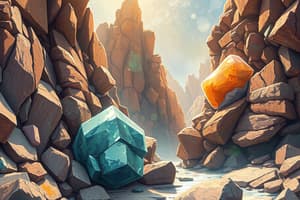Podcast
Questions and Answers
What is a mineral?
What is a mineral?
A naturally-occurring, inorganic, crystalline solid with a definite, but sometimes variable, chemical composition.
All minerals are composed of one or more elements.
All minerals are composed of one or more elements.
True (A)
What are the primary building blocks of minerals?
What are the primary building blocks of minerals?
Elements
Minerals are formed in nature by ___.
Minerals are formed in nature by ___.
Which of the following statements is true about minerals?
Which of the following statements is true about minerals?
What is the arrangement of atoms in minerals?
What is the arrangement of atoms in minerals?
Which mineral has a fixed chemical composition?
Which mineral has a fixed chemical composition?
Impurities can alter the appearance of minerals.
Impurities can alter the appearance of minerals.
How do minerals form?
How do minerals form?
Which of the following is an example of a carbonate mineral?
Which of the following is an example of a carbonate mineral?
All minerals are solid. Is this statement true or false?
All minerals are solid. Is this statement true or false?
Flashcards are hidden until you start studying
Study Notes
What Is a Mineral?
- Defined as a naturally-occurring, inorganic, crystalline solid with a definitive chemical composition.
- Minerals are the fundamental building blocks of all rocks and can be composed of one or more types.
Elements & Minerals
- Elements are the basic building blocks of all minerals, with every mineral consisting of one or more elements.
- Examples of minerals and their chemical formulas include:
- Pyrite: [FeS2]
- Malachite: [Cu2CO3(OH)2]
- Ice: [H2O]
Naturally-occurring & Inorganic
- Minerals originate through geological processes in nature and are not made by living organisms, classifying them as inorganic.
- Diamonds serve as an example of a naturally occurring mineral composed of carbon (C).
Crystalline Solid
- Atoms in minerals are organized in an orderly, repeating three-dimensional structure, contributing to their solidity and distinct characteristics.
Chemical Composition
- A mineral’s chemical composition can be fixed or variable within certain limits.
- Some minerals, like halite ([NaCl]) or quartz ([SiO2]), have fixed compositions, while others like feldspar can have a range of compositions depending on variations of elements (e.g., potassium vs. sodium feldspar).
Impurities in Minerals
- Impurities, or trace elements, can modify the appearance and value of minerals.
- Varieties of corundum, such as ruby and sapphire, differ in color and worth due to specific impurities present.
Mineral vs. Compound
- All minerals are inorganic; compounds can be organic and do not have to consist of regular crystal structures.
- Compounds do not necessarily have to be solid (e.g., liquid water is a compound), while minerals are always solid.
- Minerals are naturally occurring, whereas compounds may be produced synthetically; thus, minerals represent a subset of compounds.
How do minerals form?
- Minerals form through crystallization, the process where gaseous or liquid atoms come together to create a solid.
- This can occur through various means, such as the cooling of molten rock (magma) or precipitation from a solution.
Classes of Rock-Forming Minerals
- Silicates: Includes feldspar ([KAlSi3O8]).
- Oxides: An example is Hematite ([Fe2O3]).
- Carbonates: Such as calcite ([CaCO3]).
- Halides: Example includes sylvite ([KCl]).
- Phosphates: An example is apatite ([Ca5(PO4)3(F,Cl,OH)]).
- Sulfides: Represented by pyrite ([FeS2]).
Studying That Suits You
Use AI to generate personalized quizzes and flashcards to suit your learning preferences.




